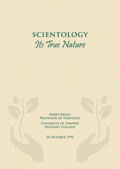Religions and religious denominations constitute such a multitude of phenomena that it has not been possible for scientists to achieve agreement upon a definition of religion. In the Finnish sociology of religion, religion is often characterized by five aspects, as has been presented by the Americans, Glock and Stark.
1. An aspect of experience (religious feelings, experiences and visions of deity, etc.).
2. An ideological aspect (ideas about God, life after death, salvation).
3. A ritual aspect (private and denominational practicing of religion, such as prayers, meditation, divine services, and religious ceremonies pertaining to the various stages of life).
4. An intellectual aspect (a knowledge of the contents of the belief).
5. The aspects of consequence (salvation, peace of mind, correct behaviour).
Usually in all definitions of religion it is assumed that there is a certain idea of belief, which when followed will lead to a harmony with the most profound meaning of life itself—whether this may be an individual God, the Supreme Being or the Cosmic or Ethical basis of life. Second, to a religion pertains religious rites and rituals and norms of behaviour. Third, religion requires a denomination of believers or members.




























